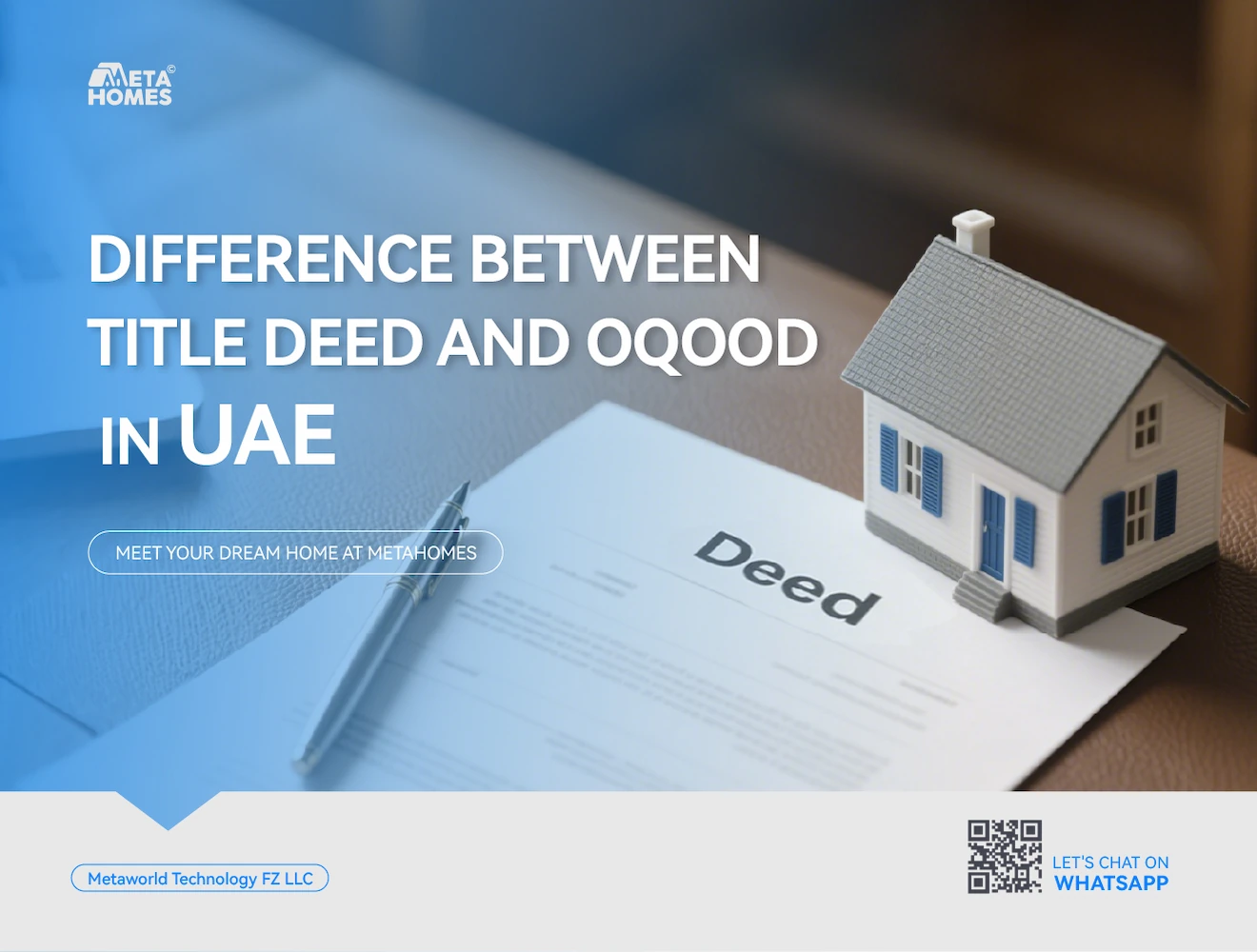
Buying property in the UAE is an exciting opportunity, but one area where many buyers get confused is the documentation. Two terms you’ll hear often are “title deed (UAE)” and “Oqood (Dubai)”.
Although they are very similar and most of the time, one is taken for the other, they serve quite different purposes, and understanding the difference can help you make smarter decisions, avoid risks, and know exactly what you own.
In simple terms, a title deed is the final proof of ownership for completed properties, while Oqood is a kind of interim registration used for off-plan or under-construction properties predominantly in Dubai.
Knowing which document applies, how to verify i,t and what it allows you to do will strengthen your confidence as a property investor or home-buyer.
What is a Title Deed in UAE?
A title deed (sometimes called “certificate of title” or “title register”) is the legal document that confirms you are the registered owner of a property.
In the UAE, once a property is completed (or a ready-to-move-in unit), all conditions are satisfied and the ownership is transferred, the Dubai Land Department issues a title deed under your name.
When you hold the title deed, you have full legal rights: to sell, lease, mortgage, gift or inherit the property. That makes it central for long-term security.
What is the Use of a Title Deed?
A title deed (sometimes called “certificate of title” or “title register”) is the legal document that confirms you are the registered and rightful owner of a property.
In UAE, once a property is completed (or a ready-to-move-in unit), all conditions are satisfied and the ownership is transferred, the Dubai Land Department issues a title deed under your name.
When you hold the title deed, you have full legal rights: to sell, lease, mortgage, gift or inherit the property. That makes it central for long-term security.
How Title Deeds Are Issued in UAE
After the property is handed over, you (or the developer on your behalf) submit the required documents: Sale & Purchase Agreement (SPA), proof of payment, no outstanding service charges, and other checks by DLD.
Upon approval, DLD creates the title deed and registers your name in the record. The DLD website itself lists the “Request to complete the initial procedures – issuing title deed” service. (dubailand.gov.ae).
Once registered, the title deed becomes the key proof of ownership.
Why is a Title Deed Important?
- It gives you full legal ownership rights of the property: something an interim document cannot guarantee your ownership and you might end up losing the property in case of any disputes.
- It allows you to resell or mortgage the property without major restrictions. Remember that banks often require a title deed in order to issue a mortgage.
- It reduces your risk. When the property is registered under your name, with the correct details, you’re less exposed to disputes.
- A title deed is a major document that is often required for official purposes like in case of residency, business registration, and other major things that require you to show proof of property ownership.
Things to Check on a Title Deed
- The very first thing to verify when you receive your Title Deed is to verify that your names are the exact name(s) on the title deed, any discrepancy can create issues.
- Check the property details: unit number, building name, floor, plot size, match with your SPA.
- Confirm there are no outstanding lines, encumbrances or service-charge arrears.
- You can use the DLD verification portal or app to confirm registration and authenticity of the property.
In essence: a title deed is your final step in owning a property in Dubai or UAE. It gives legal control.
What Is an Oqood Certificate in UAE?
“Oqood” (plural of “ʿaqd/contract” in Arabic) is a registration certificate issued by the Dubai Land Department for off-plan or under-construction properties.
If you buy a property that is not yet complete (for example in a new project), the DLD doesn’t immediately issue the title deed.
Instead, it issues an Oqood certificate as proof of your purchase and registration of the contract between buyer and developer.
Effectively, the Oqood system is a digital platform managed by DLD and its Real Estate Regulatory Agency (RERA) that registers sales contracts, protects buyer rights, tracks progress and adds transparency to the off-plan market.
How Oqood Works in UAE
Here’s a basic flow:
- The first stage is for you to sign the Sale & Purchase Agreement (commonly abbreviated as SPA) with the developer for an off-plan unit.
- After signing the SPA, the next thing is to pay the initial deposit according to the prior agreement between you and the developer, regarding how much you have to pay upfront and when you need to complete all outstanding payments.
- At this stage, the developer or buyer applies to DLD’s Oqood system. After the application, the DLD will then issue the Oqood certificate, which bears the name of the buyer, unit/property details, payment schedule, and other key details of the property.
- The project continues construction. And when it’s completed, the ownership can then be transferred to the title deed in your name (subject to payments and approvals).
Until then, Oqood gives you interim protection and legal registration.
What does an Oqood Certificate Include?
An Oqood certificate includes the following information;
- Buyer’s name
- Developer’s name
- Property/unit reference
- Payment schedule
- Project name and details
- Date of registration and Oqood number
Why Oqood is Important for Property Purchase
- It gives you legal proof of your investment in an off-plan project. That means your payment and contract are registered with the DLD, reducing risk.
- It allows you to track the project’s progress and monitor what you paid for. The system emphasises transparency.
- It is typically mandatory: Before an off-plan unit sale is valid in Dubai, the Oqood registration must be done.
Things to Consider about Oqood
- Having an Oqood does not mean you have full ownership rights (yet), since the property is still under construction or the hand-over may not have happened.
- If you merely have an Oqood without a Title Deed yet, you may have restrictions on resale, mortgage or transfer, depending on developer and project.
- Just because the Oqood is registered doesn’t mean full legality over the property or full ownership. You still need to check developer track record, project escrow status and percentage of completion, because risks still apply.
- Always ensure the Oqood is genuine (that is duly registered by the DLD) and matches your SPA details (developer, unit, price, etc.).
Title Deed vs Oqood: Side-by-Side Comparison
Here’s a clear comparison of the main features between Oqood and a Title Deed.
Feature Title Deed Oqood Certificate
Applies to Completed, ready-to-move-in properties where ownership can be officially transferred. Off-plan or under-construction units (not yet handed over).
Legal status Full legal ownership, rights to sell, lease, mortgage, inherit. Interim registration of contract; rights are provisional.
Transferability Can be sold, mortgaged, inherited freely (subject to rules) Can sometimes be transferred/resold but developer rules apply and risk remains.
Issuing body Dubai Land Department (DLD) records and issues title deeds. Oqood system under DLD/RERA issues certificate during construction.
Main purpose To confirm the final ownership once the property is complete and paid in full. To register the contract between buyer & developer and protect buyer’s rights for off-plan transactions.
Buyer protection risk Lower risk (property already ready) Higher risk (construction / hand-over still pending)
Usage for official purposes Strong (recognised by banks, government, courts) Limited, may require conversion to title deed before full benefits
Notes:
- If you buy a ready property, what you’ll receive is a title deed.
- If you buy off-plan property, you’ll have to ensure the Oqood is properly registered and aligned with your SPA.
- Knowing the difference is of great help, especially when negotiating payment, booking a unit, applying for mortgage or even determining when you can lease your unit.
- If you rely on an Oqood, it is advisable and highly recommended to monitor the progress of the project and understand the risks until title deed issuance.
Verifying Title Deed & Oqood in the UAE
One thing many buyers overlook: verifying that your document (title deed or Oqood) is legitimate, correctly issued and recorded. Here’s how to do it.
Verifying a Title Deed
In Dubai you can use the DLD website (through e-services) or the “Dubai REST” mobile app to enter the details (unit number, registry number, plot number) and check whether the title deed is registered in your name. (dubailand.gov.ae)
Important things to check on the Title Deed and Oqood Certificates:
- Verify your name is spelled correctly and matches your passport/EID.
- Check the exact unit/building address to ensure it matches your contract.
- Check and ensure that there are no outstanding encumbrances or restrictions are recorded.
What to Verify on the Oqood Certificate
Here are the most important things to verify on your Oqood certificate
- Confirm the Oqood number matches that given to you by developer/agent.
- Validate the payment schedule details and confirm they align with your SPA.
- Use DLD’s Oqood portal or check with the developer that registration is completed.
- Review project completion progress, because Oqood applies to off-plan properties, you want to know whether the development is advancing. DLD allows tracking of project status.
Mistakes to Avoid While Getting Oqood
- Assuming Oqood = title deed. Many buyers mistakenly believe an Oqood gives full ownership rights, which is of course, not the case. Only a Title Deed gives your full ownership right.
- Not checking the developer’s registration or project licence, Oqood registration does not automatically guarantee a well-managed project.
- Delaying title deed registration after handover, the sooner you convert Oqood into title deed (if applicable), the lower your risk.
- Buying a property without verifying the document type, always ask: is it accompanied by title deed or just Oqood?
NB:
Proper verification ensures that your ownership is legitimately recorded, you have a valid document, and you are in a position to exercise your rights, whether that’s to sell, mortgage, lease, or simply live in the unit without hidden issues.
Can I get a mortgage on a property that has only an Oqood certificate?
In some cases yes, but many banks require title deed issuance or a certain payment completion first. Always check with your lender.
How long does it take to convert Oqood into a title deed?
It depends on project completion, developer handover and settlement of payments. Only when property is complete and all dues are paid can the title deed be issued.
Is Oqood issued outside Dubai?
The formal term “Oqood” is specific to Dubai’s system under the Dubai Land Department for off-plan properties. Other Emirates may have similar registration systems but may use different terms.
If I only hold Oqood, am I the owner of the property?
You are registered as the buyer under the contract, and you have protection under the system, but you do not yet have full legal ownership rights in the sense of resale, mortgage or title transfer that a title deed grants.
What happens if the developer cancels the project?
If a project is cancelled and you hold an Oqood, the Dubai Land Department / RERA may intervene, transfer accounts to liquidation, and refund amounts from the escrow account according to the laws. (dubailand.gov.ae)
Can I sell a property while it’s under Oqood?
Yes, but resale is subject to developer approval, statutory rules, and payment thresholds. The process is more complex compared with title deed properties.
Conclusion
Understanding the difference between a title deed and an Oqood certificate is essential, whether you are a first-time buyer, an investor, or simply exploring the market. Each document serves a distinct purpose:
- A title deed means your ownership is fully registered, your rights are complete, and you can act with flexibility.
- An Oqood certificate means your purchase is registered while the property is still under development, giving you interim protection but not the full legal status yet.
When you buy property in Dubai or the UAE:
- Confirm what stage the property is at (off-plan vs completed).
- Ensure the correct document is or will be issued (Oqood for off-plan, title deed for ready).
- Verify the document properly through the Dubai Land Department or the relevant authority.
- Understand your rights, risks and next steps for investment, sale or lease.
As a matter of fact, your property may look great, but the document you hold is what anchors your legal and financial security.
Make the distinction, verify thoroughly, act prudently; that’s how you make the most of the UAE real-estate opportunity.



Leave a Reply